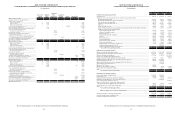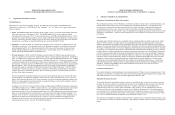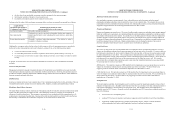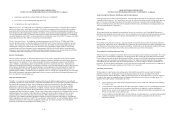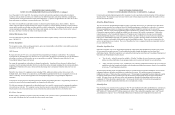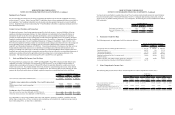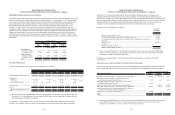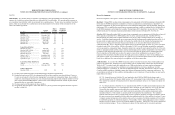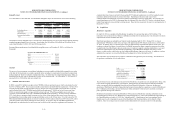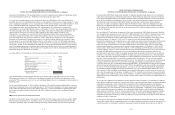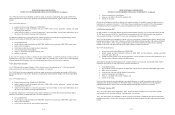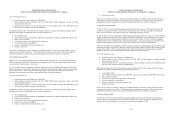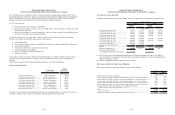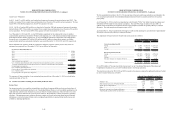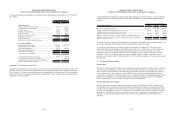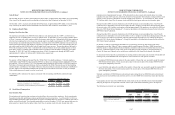Dish Network 2012 Annual Report Download - page 68
Download and view the complete annual report
Please find page 68 of the 2012 Dish Network annual report below. You can navigate through the pages in the report by either clicking on the pages listed below, or by using the keyword search tool below to find specific information within the annual report.
DISH NETWORK CORPORATION
NOTES TO CONSOLIDATED FINANCIAL STATEMENTS - Continued
Satellites
DBS Satellites. We currently utilize 15 satellites in geostationary orbit approximately 22,300 miles above the
equator, six of which we own and depreciate over the useful life of each satellite. We currently utilize capacity on
seven satellites from EchoStar, which are accounted for as operating leases. We also lease two satellites from third
parties, which are accounted for as capital leases and are depreciated over the shorter of the economic life or the
term of the satellite agreement.
Degree Estimated
Launch Orbital Useful Life
Satellites Date Location (Years)
Owned:
EchoStar I (1).................................. December 1995 77 12
EchoStar VII (2)............................. February 2002 119 15
EchoStar X (2)................................ February 2006 110 15
EchoStar XI (2)............................... July 2008 110 15
EchoStar XIV.................................. March 2010 119 15
EchoStar XV................................... July 2010 61.5 15
Leased from EchoStar:
EchoStar VI (1)(4).......................... July 2000 77 NA
EchoStar VIII (1)(3)(4)................... August 2002 77 NA
EchoStar IX (1)(3).......................... August 2003 121 NA
EchoStar XII (1)(4)......................... July 2003 61.5 NA
Nimiq 5 (1)(3)................................. September 2009 72.7 NA
EchoStar XVI (1)............................ November 2012 61.5 NA
QuetzSat-1 (1)(3)............................ September 2011 77 NA
Leased from Other Third Party:
Anik F3........................................... April 2007 118.7 NA
Ciel II.............................................. December 2008 129 NA
Under Construction:
EchoStar XVIII............................... 2015 110 15
(1) See Note 20 for further discussion of our Related Party Transactions with EchoStar.
(2) During the fourth quarter 2012, the estimated useful life of these satellites was extended from 12 years to
15 years on a prospective basis based on management’s assessment of, among other things, these satellites’
useful lives, technological obsolescence risk, estimated remaining fuel life and estimated useful lives of our
other owned and leased DBS satellites. This increase in the estimated useful life of these satellites had an
immaterial effect on our results of operations.
(3) We lease a portion of the capacity on these satellites.
(4) We generally have the option to renew each lease on a year-to-year basis through the end of the respective
satellite’s useful life.
F-26
DISH NETWORK CORPORATION
NOTES TO CONSOLIDATED FINANCIAL STATEMENTS - Continued
Recent Developments
Recent developments with respect to certain of our satellites are discussed below.
QuetzSat-1. During 2008, we entered into a transponder service agreement with EchoStar expiring in November 2021
for the lease of 24 DBS transponders on QuetzSat-1, which is accounted for as an operating lease. QuetzSat-1 was
launched on September 29, 2011 and was placed into service during the fourth quarter 2011 by EchoStar. During the
third quarter 2012, we and EchoStar entered into an agreement pursuant to which we sublease back to EchoStar five of
the 24 DBS transponders on the QuetzSat-1 satellite. During January 2013, QuetzSat-1 was moved to the 77 degree
orbital location, and we commenced commercial operations at that location in February 2013. See Note 20.
EchoStar XVI. During December 2009, we entered into a transponder service agreement with EchoStar to lease all
of the capacity on EchoStar XVI, a DBS satellite, after its service commencement date. EchoStar XVI was
launched during November 2012 to replace EchoStar XV at the 61.5 degree orbital location and is currently in
service. Under the original transponder service agreement, the initial term generally expired upon the earlier of: (i)
the end-of-life or replacement of the satellite; (ii) the date the satellite failed; (iii) the date the transponder(s) on
which service was being provided under the agreement failed; or (iv) ten years following the actual service
commencement date. Prior to expiration of the initial term, we also had the option to renew on a year-to-year basis
through the end-of-life of the satellite. Effective December 21, 2012, we and EchoStar amended the transponder
service agreement to, among other things, change the initial term to generally expire upon the earlier of: (i) the end-
of-life or replacement of the satellite; (ii) the date the satellite fails; (iii) the date the transponder(s) on which service
is being provided under the agreement fails; or (iv) four years following the actual service commencement date.
Prior to expiration of the initial term, we have the option to renew for an additional six-year period. Prior to
expiration of the initial term, EchoStar also has the right, upon certain conditions, to renew for an additional six-
year period. If either we or EchoStar exercise our respective six-year renewal options, then we have the option to
renew for an additional five-year period prior to expiration of the then-current term.
2 GHz Satellites. As a result of the DBSD Transaction and the TerreStar Transaction, three 2 GHz satellites were
added to our satellite fleet, including two in-orbit satellites and one satellite under construction, discussed below.
While the FCC’s recently issued rules applicable to our 2 GHz authorizations no longer require an integrated
satellite component, we may use these satellites in our commercialization of wireless spectrum or for other
commercial purposes. In addition, T1, which we acquired through the TerreStar Transaction, is subject to certain
Canadian satellite regulations, including, among other things, an integrated satellite component requirement. We
are evaluating our options for these satellites and depending on our eventual use of these satellites, we may need to
impair them in the future.
D1. D1, formerly known as EchoStar G1, was launched in April 2008 by DBSD North America and is
currently located at the 92.85 degree orbital location. D1 was designed to meet a minimum 15-year useful life.
This satellite has currently not been placed into its intended commercial service as we evaluate our options for
future uses.
T1. T1, formerly known as EchoStar T1, was launched in July 2009 by TerreStar and currently operates at the
111.1 degree orbital location. T1 was designed to meet a minimum 15-year useful life. Prior to the TerreStar
Transaction, this satellite experienced certain solar array anomalies. During the fourth quarter 2012, the
primary attitude control electronics unit, which controls the orientation of the satellite, experienced certain
anomalous behavior. This anomaly is currently under investigation by the manufacturer. The redundant
attitude control electronics unit is currently being used for operations while the investigation continues. While
this most recent and prior anomalies did not reduce the estimated useful life of the satellite to less than 15 years
or impact commercial operation of the satellite, there can be no assurance that future anomalies will not reduce
its useful life or impact its commercial operation. This satellite, which is being depreciated, carries a nominal
amount of traffic to support a service for a limited number of customers. During 2012, this service experienced
certain intermittent outages. We are evaluating our options for this satellite and its associated operations.
F-27


